Baratunde Thurston: Speaker. Writer. Activist. Outdoorsman? Until not very long ago, the “O” word would have appeared precisely nowhere on the multihyphenate’s absurdly long list of professional accomplishments and disparate (but fancy) job titles. Best-selling author? The 44-year-old Washington, D.C., native is certainly that, thanks to his satirical 2012 memoir-meets-self-help tome How to Be Black. Emmy-nominated podcast host? Affirmative. Tech-savvy futurist fluent in analyses of cryptocurrency and web3 innovations? That’s indeed a core component of Thurston’s résumé. TED Talk lecturer? Stand-up comedian? Social engagement advisor to the Obama White House? Check, check, and double check.
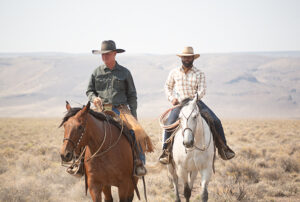
And yet, there’s still new ground for Thurston to cover. With his new PBS travelogue series, America Outdoors with Baratunde Thurston, he’s bringing his lifelong fascination with the natural world—and more specifically, his intent to find out, “How does our relationship with the outdoors define us as individuals and as a nation?”—into the public realm for the first time. As a former Boy Scout and self-described “city kid” who grew up hiking in the Blue Ridge Mountains and camping along the Outer Banks of North Carolina (to mitigate “coming of age during D.C.’s decline in terms of crime, crack, and gangs,” he explains), Thurston characterizes this latest career zag as a comeback of sorts.
Understood one way, the show is his reaction to living in America’s coastal metropolises for most of his adulthood, finding himself increasingly cut off from birdsong and breezes, shuffling through the day-to-day surrounded by concrete and glass. But Thurston also pursued the America Outdoors job as a response to his upbringing. His mother, an avowed outdoorswoman and card-carrying Sierra Club member, schlepped him from campground to campground up and down the Eastern Seaboard, ensuring her son never lacked for fresh air. “This is a return to my natural state,” Thurston tells me as we scale a particularly steep section of the Fiji Hill loop trail in Los Angeles’s Eagle Rock neighborhood, near his current home. “I got really involved with technological connectivity and IP addresses and broadband and all that, and—” he pauses for a moment to regard the sun-soaked, 360-degree vista, abutted by the San Rafael Hills, “—I got a little disconnected from all this.”
Shot over a compressed six weeks last year, during a time of spiking N95-era COVID infection rates, America Outdoors features no small amount of Thurston rallying his inner Bear Grylls to solidify his outdoorsy bona fides. The host is shown alternately striding along the Appalachian Trail and ingratiating himself with a group of formerly incarcerated firefighters in the desert foothills of Southern California. He shoots whitewater rapids in West Virginia and paddles into the lineup with a group of Black surfers in Malibu. He sails over the sand dunes of Kitty Hawk, North Carolina, on a replica Wright brothers glider and gamely jogs through the searing heat of Death Valley.
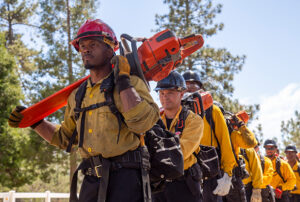
The show, as you might guess, is much more than a greatest hits tour of the American outdoors. Thurston is a wisecracking Harvard alum who spent 10 years on the comedy circuit and exploded into public consciousness with How to Be Black—a nonfiction title that semi-seriously contemplates such questions as, “When Did You First Realize You Were Black?” and “Can You Swim?” while sermonizing on “How to Be the Black Employee” and “How to Speak for All Black People” (skewering certain monolithic “ideas of Blackness” in the process). He sets out to quietly, implicitly, and elegantly challenge many cultural assumptions, by carefully curating the people he talks with beneath the country’s open skies.
That Appalachian Trail segment, for instance, also serves as a showcase for the accomplishments of Jennifer Pharr Davis, who set the fastest recorded time on the trail but in no way resembles the Grizzly Adams type one might assume would want to hike 2,200 miles in 46 days. Thurston’s rafting guide is a paraplegic adventure sports instructor and facilitator named Eric Thompson, who devised a way to navigate roiling whitewater without the use of his legs (thereby upending prescribed notions of who can or even should enjoy the outdoors). And introducing Thurston to the triple-digit scorch of desert distance running is Mosi Smith, an African-American U.S. Marine Corps veteran and multiple-time entrant in the Badwater Ultramarathon—a 135-mile endurance test dubbed the “toughest race on the face of the earth”—with whom the host discusses hate-crime victim Ahmaud Arbery and the perils of “running while Black.”
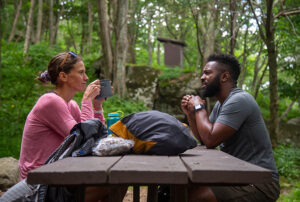
“I’ve been a fan of telling stories that matter,” Thurston explains. “Comedy has helped me do that in a way that connects with people, even though it’s indirect. Through that, I can reach folks who may not want to be reached by me at all.”
“Look, rabbits!” he exclaims, cheerily startled as a pair of Lepus californicus hop onto our path from the shadow of an evergreen tree. Then he continues: “It’s one thing to talk about America from a tall building in New York behind a shiny desk. It’s another to talk with America outside. So this show restored some sense of actual conversation—because I’m really listening. And I’m going to connect with people in the spaces where they’re most comfortable.”
An extreme extrovert with an easy grin and a natural facility for both off-the-cuff jokes and on-the-fly interviewing (sometimes under extreme physical duress), Thurston has also, notably, made hamburger out of our culture’s most sacred cows as political and digital director for the spoof-news website The Onion and as a producer for The Daily Show with Trevor Noah. But he puts aside any left-leaning political agenda during an America Outside interview with James “Ooker” Eskridge, a fourth generation crab fisherman and mayor of Tangier, Virginia—a tiny island community in the Chesapeake Bay that is sinking into the Atlantic due to rapidly rising sea levels and soil erosion advanced by climate change. An evangelical Christian who, like 87 percent of Tangier’s residents, voted for Donald Trump during the 2016 presidential campaign, Eskridge questions the scientific validity of man’s responsibility for changes to earth’s climate. But he shares an on-camera story with Thurston about having to unearth the remains of a family member from a local graveyard that was being eaten away by the sea, reburying body parts and restoring his relation’s headstone further inland to escape the ever-rising tide.
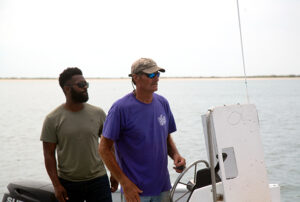
“We are never going to vote the same way in the presidential election,” Thurston says of Eskridge. “But I felt his humanity. And he literally broke bread with me and opened up his world to me, not fearing that I’m going to do some liberal media hit job. We can differ on our politics. We can have completely divergent views. But when you strip away those things, the stuff that bonds us is so much more tangible. Like caring about the place where you live, the way of life that you love disappearing, taking care of your ancestors.”
That bridge-building outlook and intentional avoidance of partisan politics finds natural expression in Thurston’s podcast How to Citizen with Baratunde, which was named one of Apple’s favorite podcasts of 2020 and winner of the Social Impact Award at the 2021 iHeartRadio Podcast Awards. It’s his signature form of activism—the endeavor Thurston places “at the top of a long list of things I’m up to”—and he describes it as a catalyst for America Outdoors.
“To citizen, as a verb, is active,” Thurston says. “We’re changing the grammar to say, ‘What could we do?’ To citizen, as a verb, means we show up and participate. It doesn’t mean you have to run for office, but it means you get to do something. You get in the game. It means we invest in community. It means we invest in relationships with ourselves, with others, and with the planet around us. It is people power. The whole purpose of citizenry is community membership; otherwise we’re just islands doing everything for ourselves. Struggling.”
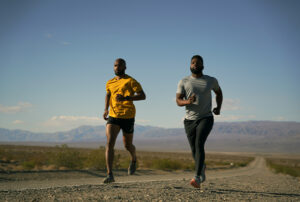
As the two of us navigate a downhill section of the trail, our sneakers scrabbling against the loose sand and scrub brush of this hilly pocket of suburbia-ringed nature, Thurston details a few of his other upcoming projects. In addition to consistent gigs as a paid lecturer (addressing topics in a How to Citizen vein) and as a columnist for the new-media newsletter platform Puck, he’s currently developing a TV series based around How to Be Black with Laurence Fishburne, and he recently pitched another small-screen autobiographical project based on a different period of his life. (It’s too early to divulge details). Both of these will take his style of multifaceted content creation into scripted territory. While Thurston’s abiding interests have remained remarkably consistent over the decade since he published How to Be Black—encompassing race, politics, culture, technology, and climate change—the process of filming America Outdoors got him thinking differently about the substantive human connections that can be enabled only by the great outdoors.
“A lot of the ways we try to talk about difficult things is to keep it all up in our heads,” Thurston says. “We refer to talking points and white papers and data sets. That’s cool for academia, but life happens out here. And so if I can be surfing with someone, fishing with someone, horseback riding with someone, and things just naturally come up in a different tone, then there’s a lot more respect—because we’re both in awe of and respecting the nature around us.”
Next Up: 5 Thrilling Outdoor Family Adventures to Try This Summer




